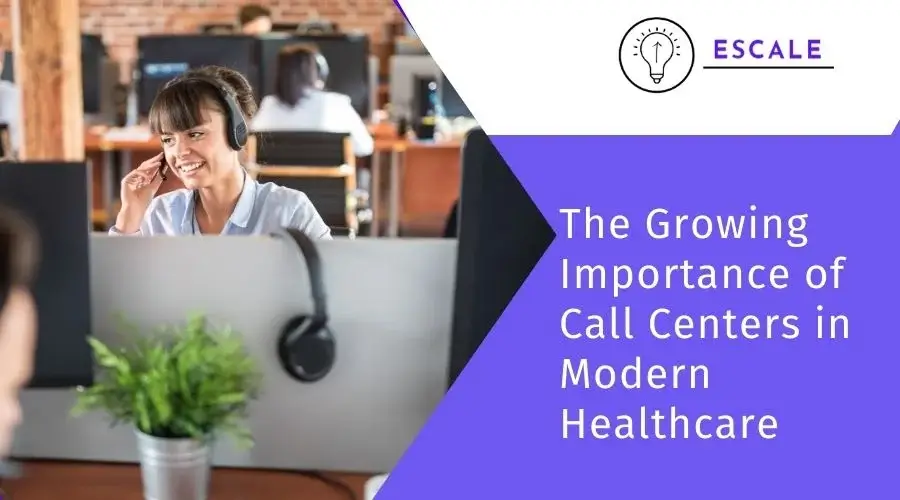In today’s rapidly evolving healthcare landscape, hospitals face unprecedented challenges in managing patient communications efficiently. With the increasing demand for healthcare services and the growing complexity of patient needs, effective management of high-volume patient inquiries has become crucial for healthcare providers.
This is where specialized call center agency for healthcare practitioners, like eScale, play a pivotal role in bridging the communication gap between hospitals and their patients, ensuring seamless interaction while maintaining the highest standards of care and compliance.
The Growing Demand for Healthcare Communication Management
The healthcare industry has witnessed a significant surge in patient inquiries, driven by increased healthcare awareness, an ageing population, and the rise of chronic disease management needs. Expanding telehealth services and complex insurance requirements have intensified the demand for robust communication systems. Healthcare providers must now manage traditional patient inquiries and navigate the complexities of modern healthcare delivery, including telehealth coordination and digital health records management.
Impact of Global Health Crises on Hospital Communication
Recent global health challenges have dramatically transformed how hospitals manage patient communications. Healthcare facilities faced unprecedented situations where call volumes increased by 300-400% virtually overnight. This surge highlighted the critical need for scalable, resilient communication systems. eScale responded by developing specialized protocols for emergency information dissemination, vaccination scheduling, and testing coordination, while simultaneously managing routine healthcare inquiries.
Critical Functions of Healthcare Call Centers
Modern healthcare call centers serve as the primary point of contact between hospitals and patients, handling a complex array of services. Appointment management remains a core function, encompassing scheduling, cancellations, and reminders across multiple departments. Patient information management has evolved to include comprehensive data handling, from demographic updates to prescription refill requests and test result communications.
Emergency response coordination represents another crucial aspect of healthcare call center operations. Call center staff must be trained to triage urgent medical concerns, direct emergency cases to appropriate facilities, and provide after-hours support. This requires a delicate balance of technical knowledge and emotional intelligence.
Technology Integration in Healthcare Call Centers
eScale’s advanced call center solutions incorporate cutting-edge technologies to enhance service delivery. Artificial Intelligence and Machine Learning power automated response systems and predictive analytics, while seamless Electronic Health Record (EHR) integration ensures real-time access to patient information. Cloud-based infrastructure enables scalability and remote workforce management, which is crucial for maintaining continuous service during disruptions.
Key technological innovations include:
- AI-powered triage systems
- Natural language processing for improved communication
- Integrated telehealth platforms
- Mobile solution integration
- Advanced analytics capabilities
Quality Assurance and Compliance
Healthcare call centers must maintain strict quality standards while ensuring regulatory compliance. HIPAA compliance forms the cornerstone of operations, requiring secure data transmission protocols, regular staff training, and comprehensive audit trails. eScale implements robust quality monitoring systems that track performance metrics while maintaining patient privacy and data security.
Data Analytics and Performance Optimization
Modern healthcare call centers generate valuable data that drives continuous improvement. Advanced analytics platforms track operational metrics, patient satisfaction trends, and resource utilization patterns. This data-driven approach enables healthcare providers to optimize their services and allocate resources more effectively.
Performance monitoring focuses on key metrics such as average handle time, first-call resolution rates, and patient satisfaction scores. These insights help identify areas for improvement and guide strategic decision-making.
Cost-Effectiveness and ROI
Implementing professional call center services through eScale provides significant financial benefits through both direct cost savings and indirect advantages. Healthcare organizations typically see reduced staffing requirements, lower infrastructure costs, and improved resource utilization. Additionally, enhanced patient satisfaction leads to better retention rates and improved revenue cycle management.
Future Trends in Healthcare Call Center Operations
The future of healthcare call centers continues to evolve with emerging technologies and changing patient expectations. Key developments include:
- Integration of AI-powered virtual assistants
- Enhanced telehealth support capabilities
- Proactive patient engagement systems
- Advanced remote monitoring solutions
- Personalized communication strategies
Choosing the Right Healthcare Call Center Partner
When selecting a healthcare call center service provider, hospitals should evaluate industry experience, technical capabilities, and compliance certifications. eScale distinguishes itself through specialized healthcare expertise, advanced technology integration, and comprehensive training programs. Our solutions are customizable to meet specific hospital needs while maintaining consistent service quality.
Best Practices in Healthcare Call Center Management
Successful healthcare call center management requires a comprehensive approach to staff training, technology adoption, and risk management. eScale emphasizes continuous professional development, ensuring staff maintain expertise in medical terminology, emergency protocols, and cultural sensitivity. Regular performance monitoring and feedback systems help maintain service excellence.
Measuring Success and Impact
Healthcare organizations must evaluate call center effectiveness through various metrics and quality indicators. Beyond traditional KPIs, successful implementation considers patient satisfaction, operational efficiency, and revenue impact. eScale’s comprehensive reporting systems provide detailed insights into service performance and ROI.
Conclusion
As healthcare continues to evolve, the role of specialized call centers in managing high-volume patient inquiries becomes increasingly crucial. eScale’s comprehensive healthcare call center solutions provide hospitals with the tools and expertise needed to enhance patient communication, improve operational efficiency, and maintain high standards of care delivery.
The future success of healthcare organizations depends heavily on their ability to manage patient communications effectively. By partnering with eScale, hospitals can focus on their core mission of providing excellent patient care while ensuring efficient communication management. This investment in professional call center services not only improves patient satisfaction but also contributes to the overall success and sustainability of healthcare organizations in today’s competitive landscape.



